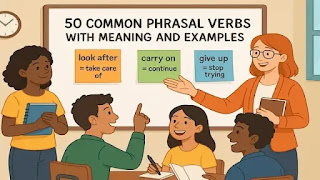What are the 50 Phrasal Verbs with Meaning and Examples?


Tum khana khaaye.
you ate food
Wah aaya. Wah gayaa
He came, he went
Isme
Verb ki second form lagega
Structure ke rule se
Isme (1)sutra. S+v me Verb ki Second form hogi.
Baki sab me helping verb (2) (6) sutra me did. ka puryog hoga pura rule wahi lagega.
Structure rule (1)(6)
(1)S+v.
He came Verb Second form
You went
(2)S+hv+not+v.
you didn't go. Verb First form
He didn't come
(3)Hv+S+v
Did you speak English?
Did she go to market.?
(4)hv+not+s+v.
Didn't you like apple?
Didn't you purchase mobile.?
(5)Qw+hv+s+v.
Where did you go?
When did you come?
How did he invite to ambaani.?
Why did you speak English.?
What did you eat food?
(6)Qw+hv+not+s+v
Where didn't you go?
When didn't you write?
How didn't he invite to ambaani?
Why didn't you speak English?
What didn't you eat food?
Tum khana kha rahe the
you ware eating food.
Wah aa raha tha Wah ja raha tha
He was coming he was going
Isme
verb me ing lagega.
Structure
Isme (1)sutra. S+hv+v
helping verb (1) (6) sutra me was, ware. ka puryog hoga pura rule wahi lagega.
Example=
(1)S+Hv +v
He was coming
You ware going
(2)S+hv+not+v.
you ware not going
He wasn't coming
(3)Hv+S+v
Ware you speaking English?
Was she going to market.?
(4)hv+not+s+v.
Ware not you liking apple?
Wasn't you purchasing mobile?
(5)Qw+hv+s+v.
Where ware you going?
When ware you coming?
How was he inviting to ambaani.?
Why ware you speaking English.?
What ware you eating food?
(6)Qw+hv+not+s+v
Where ware not you going?
When ware not you writing?
How wasn't he inviting to ambaani.?
Why ware not you speaking English.?
What ware you not eating food.?
Tum khana kha chuke the
you had eaten food.
Wah aa chuka tha Wah ja chuka tha
He had come he had gone
Isme
Verb 3rd form lgega.
Isme (1)sutra. S+hv+v
helping verb (1) (6) sutra me Had ka puryog hoga Singular Plural dono ke Saath. pura ka pura rule wahi lagega.
Structure rule (1)(6)
(1)S+Hv +v
He had come
You had gone
(2)S+hv+not+v.
you hadn't gone
He hadn't come
(3)Hv+S+v
Had you spoken English?
Had she gone to market.?
(4)hv+not+s+v.
Hadn't you liked apple?
Hadn't you purchased mobile?
(5)Qw+hv+s+v.
Where had you gone?
When had you come ?
How had he invited to ambaani.?
Why had you spoken English.?
What had you eaten food?
(6)Qw+hv+not+s+v
Where hadn't you gone?
When hadn't you written ?
How hadn't he invited to ambaani.?
Why hadn't you spoken English.?
What hadn't you eaten food.?
Tum 2 baje se naha rahe the
you had been both since 2 o clock
Wah 10 din se padh raha tha
He had been reeding For 10 days.
He had been coming for 1 hours
Isme
Verb me ing form lgega. Helping verb me had been since for lagega
Isme (1)sutra. S+hv+v
(1) (6) sutra me Had been ka puryog hoga Singular Plural dono ke Saath. pura ka pura rule wahi lagega.
Structure rule (1)(6)
Example=
(1)S+Hv +v
He had been coming since 2 o clock
You had been going since Sunday
(2)S+hv+not+v.
you had not been going to for 2 year
He had not been going to since 1999.
(3)Hv+S+v
Had you been speaking English for 15 minute ?
Had she been going to market since 2 o clock?
(4)hv+not+s+v.
Had you not been liking apple for 1 month ?
Had you not been purchasing mobile for 1 weak?
(5)Qw+hv+s+v.
Where had you been going since 3 o clock ?
When had you been coming for 2 week?
How had he been inviting to ambaani. Since Sunday ?
Why had you been speeking English for 25 days?
What had you been eating food for 30 minute?
(6)Qw+hv+not+s+v
Where had you been not going since 1 o clock ?
When had you been not writing for 1 hour?
How had he been not inviting to ambaani since morning ?
Why had you been not speaking English since Saturday ?
What had you been not eating food for 2 year?
Comments
Post a Comment
Please Don't Enter Any Spam Link In The Comment Box.